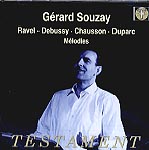If you love French melodies, then 80 minutes of Gérard Souzay in his prime makes this a necessary acquisition. Everything here was recorded in the early 1950s when his voice was at its freshest. His singing is full of subtleties in these selections, central to the baritone’s repertoire, especially in the elusive Duparc songs, 12 of which comprise more than half the CD’s length. In the first two stanzas of “Le Manoir de Rosemonde”, for example, Souzay masterfully finds the thin line between declamation and song, and in the last two stanzas, few singers can so successfully suffuse the voice with sadness without risking sentimentality. He also colors the voice with a tenderness that brings out the emotions of songs like “Elégie” and “Phidylé”, and his flawless phrasing makes “Sérénade florentine” come alive.
The three songs of Ravel’s Don Quichotte à Dulcinée were written for a Chaliapin film (Ibert’s were chosen instead) and Souzay is quite wonderful in them. His repeated line, “O Dulcinée”, in the “Chanson Romanesque” is filled with the Don’s longing, and in that rousing example of Ravel’s faux-Spanish style, the drinking song “Chanson à boire”, Souzay lets his hair down, conveying the humor of the tipsy Don without exaggeration.
The Debussy set includes the “Notre Dame” song from the Villon Ballads, which finds Souzay in his smoothest voice. The seven Chausson songs offer more of the same–a lovely head voice in “Nanny”, a delightful “Sérénade italienne” that seems made for Souzay’s high register, an alluring “Les Papillons”, and a “Le temps de lilas” from Poème de l’amour et de la mer that revels in its hothouse atmosphere. At times in the Duparc and Chausson sets we might prefer slightly more animated tempos, but that’s a minor quibble. More germane is the close-up recording that distorts the relationship between singer and accompaniments, the piano that’s set back and bereft of detail, and the orchestra in the Ravel and Debussy songs that’s sometimes indistinct and gray. Full texts and translations are included. Like others in Testament’s invaluable series of Souzay’s 1950s Deccas, this is a treasure-trove of vocal delights. [2/12/2004]
































